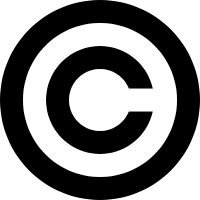Internet Copyright Issues
Disclaimer: I am not a lawyer. My knowledge only comes from experience providing online content. Before you take legal action or file a DMCA notice, please seek legal counsel or verify your case by reviewing the copyright law at www.copyright.gov.
Internet Copyright Laws - Basics
Copyright Laws offer protection for intellectual property online in the same way that they protect more physical versions. Note that copyright protection applies to many different forms of content by default. It is no longer necessary to explicitly label a work as copyrighted or file for a copyright with the United States Copyright Office (although filing a work with them is usually a good idea for major works where legal trouble is expected).
What this means for Internet copyright issues is that most works online are under some form of protection unless otherwise stated.
Written works are completely protected. You can’t copy someone’s work without their permission or at least a citation (if it falls under fair use, see below). There are some exceptions. Naturally someone can’t claim copyright infringement for a universal fact. Another exception is the issue of titles. A title can’t be copyrighted under U.S. law. For example, if someone else wrote an article with the title “What Everyone Should Know about Copyright Laws: Internet Tips & Guides,” but wrote a unique article, it would not be infringement. As you can see, written works generally have common sense copyright laws.
Copyright protection applies to unique websites and website templates, although that’s naturally a fuzzy area except in cases of direct copying. In the case of a third-party designer, the rights to the website’s design are usually signed over to the website’s owner.
Images and videos also fall under fairly common sense laws. They belong to the original producer (and the original producer needs to take care of obtaining releases and not violating any privacy laws while filming or photographing). You cannot take a photo or video from someone and host it as your own online. Simply noting that it isn’t yours isn’t necessarily enough to remove the Internet copyright issue. The media belongs to either the original producer or the website it is hosted on. Some image and video hosts allow users to use their media elsewhere as long as their rules are followed.
For example, Morguefile.com provides completely free images that don’t even need an attribution. Flickr.com has a more complicated set of rules, since it allows users to set the license for their image. Some allow anyone to use it as long as the image is linked back to them, while other have stricter regulations. In general, before you take an image or video from a website, check their creative commons or licensing policy.
Internet Copyright Laws - Fair Use
Fair use is probably one of the most important concept for copyright laws on the Internet, primarily because it seems to get throw around a lot but it is often not understood.
Fair Use is in place so that works may be used for educating others, providing research, reporting news and reviewing works. For fair to use to apply to copyrighted media, you need to be pursuing one of these goals while also considering potential economic harm to what you’re copying. The fairly standard example would be a book review. It would be quite wrong for someone to included xeroxed copies of the entire book with the review. Obviously that has the potential to hurt sales for the copyrighted material, therefore, the review is only allowed to cite certain passages. This is also why a professor can use examples from a book in their lecture, but they can’t usually copy entire sections for the class (and save everyone a lot of money).
Note that not just the amount of material you quote is considered. The most well known case here involves a magazine that published 300 words of quotes from President Gerald Ford’s memoirs. While this was a very small portion of the total volume of the work, it was published before the memoires themselves, and in some sense gave away the most important part of the book. Another magazine which had offered to pay to run a much larger excerpt of Ford’s book pulled this offer. The publisher of the memoirs sued the magazine successfully with the courts feeling that there was a “market effect:” The amount of money the publisher could make from the book had been altered.
Always keep these standards in mind if you’re claiming that you’re protected by fair use standards.
Internet Copyright Laws - DMCA Takedown Notice
If you’re the victim of copyright infringement (or want to know what to do should it arise), then DMCA takedown notices will probably come into play. We actually have a template for a DMCA Takedown notice and some basic information on what to do with it. In most cases of real infringement, the stolen content should be taken down with no real conflict. If they made substantial money off of the content, then you can look into legal action, but this is probably going to be too expensive for the average offence.
You can also file a DMCA notice with Google to have the offending material removed from search result pages.
